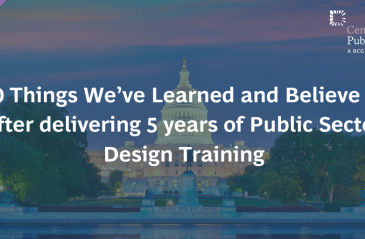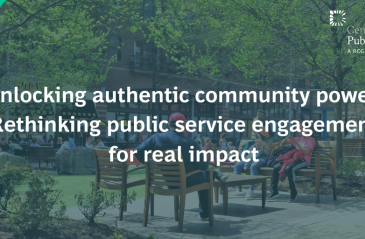
10 things we’ve learned and believe in after delivering 5 years of Public Sector Design Training

A new people-powered party in Lebanon – Sabaa – is helping to place citizens' concerns centre-stage #FindingLegitimacy
Share articleSabaa was set up to foster fresh leadership and help citizens into public life in #Lebanon #FindingLegitimacy
Share articleSabaa aims to be a new and inclusive channel for citizens who want to help serve #Lebanon #FindingLegitimacy
Share articleWe put our vision for government into practice through learning partner projects that align with our values and help reimagine government so that it works for everyone.
To visit Lebanon is to step into a country of contrasts, one unlike almost any other. This small country on the shores of the Mediterranean can draw on a rich history, glorious natural scenery, and some of the best beaches you'll find anywhere - no wonder it has a burgeoning tourism industry.
Unfortunately, life for the vast majority of its population of around five million is less than idyllic. Challenges abound, particularly surrounding the poor standard of municipal services and infrastructure. Of particular concern is the unreliable power supply, leading to frequent blackouts and high energy prices that hit both individual consumers and the wider Lebanese economy. Similarly, the 2015 refuse crisis has led to mountains of rubbish filling the streets of Lebanon and, more recently, has caused controversies with untreated waste being dumped into the Mediterranean Sea.
Another issue is the prevalence of Syrian refugees, who streamed across the border after civil war engulfed their country in recent years. Today, well over one million of them live in Lebanon, placing further strain on public services and leading to tensions as locals and refugees compete for often scarce employment.
These frustrations set the scene for the creation in recent years of Sabaa, a new people-powered modern political party with citizen-centricity at its core. “We are in a very difficult financial and economic situation,” says Jad Dagher, its general secretary and one of its designers. While young - it only launched towards the end of 2016 - Sabaa has bold ambitions for the future and is not settling for anything less than a total transformation of the country's social, economic and political system. It is a nationwide organisation, created to provide a new national and multi-confessional platform that could organise the participation of citizens in public life and foster new leaderships across the nation.
“Sabaa is not a protest movement,” Dagher explains. “A protest movement is when you still believe in the political class and their potential to change and do the right thing. We have done this for the past 40 years with no results, so Plan B is to start to replace the current political leadership and create new leaders at every level. Just protesting on the streets would not be enough and nor would thinktank approaches, where round tables of experts are paralysed by analysis. What we need to do is put some critical mass behind ideas - a network of humans behind those ideas of the thinktanks.”
Dagher traces much of the success of this nascent organisation to its laser-like focus on the people - their needs, their aspirations, their desires. “Sabaa is not a party built around a person,” he says. “Rather, it is simply a platform and opportunity for the people who want to be involved in public life in the country and be independent of the current political leaders of Lebanon. So, it is a new channel for citizens who want to help serve their country.”
He goes on to say that its policy programme is geared towards inclusivity and transparency, and has people at its heart. “We do not believe in a model where the economy crushes the citizens - we want one where the citizen is at the top level of the pyramid,” he continues. “We have launched a campaign called ”Smile of a Nation”, which is about involving citizens in all regions so they can rate and give their opinion on local needs. These surveys are being undertaken by local Sabaa activists in all regions and enable us to include local people in the programme itself.”
Given that Sabaa has made such rapid strides, attention is already turning to where it is headed in the future. What are they hoping to accomplish? Where are they planning on focusing their activities?
Sabaa is gearing up for parliamentary elections, and Dagher says that the structure of the organisation is itself a strong message about how it intends to do things differently. “We don't have a president - political decision-making is done by an executive board - and our financial transparency is very different to other political parties,” he points out. “Our internal elections have to be monitored by external observers, and there is no one position that anyone can run for more than twice in succession.”
That said, he admits that there are many challenges that lie in wait. “Although I can honestly say we have had large success because we already have about 5,000 members after just one year, we have much to do,” he says. “Citizens in Lebanon have gone from one deception to another and so have become resistant to new initiatives. At the same time, we believe that it will take one moment of enlightenment and this can grow exponentially. We are preparing in the right way, we are organising, preparing our experts and training our activists.”
The twists and turns of Lebanon's history make it difficult to predict with any certainty what might lie ahead. But no one can argue that Sabaa is not aiming high.
“We are a platform for sustainable political activism, structured to absorb thousands of people,” concludes Dagher. “Our main objective is to help citizens reach decision-making positions in order to turn the country around. We want to create a modern, open, successful country, one that is a leader in the Middle East, and that's why we have to have hope. If we organise well and become many under one identity, then really nothing can stop us.”
What is legitimacy to you? Where do you see legitimacy working well? How governments work with citizens to build legitimacy is a big question for CPI.
Find out how to get involved in our Finding Legitimacy project
Picture credit: Sadik Gulec / Shutterstock.com











